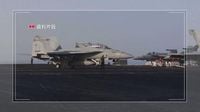Oman has announced that the United States and Yemen's Houthi armed forces have reached a ceasefire agreement, a significant development in the ongoing conflict that has drawn international attention. This announcement was made on May 7, 2025, by Oman's Foreign Minister Badr al-Busaidi, who stated that the two sides will cease hostilities, including refraining from targeting American vessels in the Red Sea and the Bab el-Mandeb Strait. This move aims to ensure freedom of navigation and facilitate the smooth flow of international commercial shipping.
During a meeting with Canadian Prime Minister Justin Trudeau at the White House, U.S. President Donald Trump confirmed the ceasefire, indicating that the Houthi forces had agreed to stop threatening navigation security in the Middle East waters. Trump also announced that the U.S. military would halt its bombing campaign against the Houthi armed forces. He remarked that the Houthis had even 'surrendered' in light of these developments, although this characterization remains contentious.
The Houthi armed forces, which control approximately one-third of Yemen's territory and occupy strategic locations including the capital city of Sanaa and the vital port of Hodeidah, responded cautiously. They stated they would evaluate the actions of the United States while reiterating their support for ending the ongoing conflict in Gaza. However, they also clarified that the ceasefire does not include a halt to their attacks on Israel, underscoring the complex geopolitical dynamics at play.
Foreign Minister Badr emphasized the importance of this ceasefire in ensuring the safety of maritime routes in the Red Sea, which is crucial for international trade. He stated, "The two sides will no longer attack each other, ensuring freedom of navigation for international commercial shipping in the Red Sea." This agreement marks a notable shift in Houthi policy since the escalation of tensions in the region, particularly following the recent Israel-Hamas conflict.
Despite the optimism surrounding the ceasefire, uncertainties linger about its durability. Observers note that the Houthi forces may still choose to target vessels in the future, especially given their history of aggression in the region. Since October 2023, the Houthis have launched 137 attacks on ships in the Red Sea, resulting in the sinking of two civilian vessels. Their attempts to strike U.S. warships have largely been unsuccessful, with no U.S. ships reportedly hit by Houthi missiles or drones during the ongoing conflict.
The U.S. military's recent operations against the Houthis included a large-scale airstrike campaign initiated on March 15, 2025, dubbed 'Operation Rough Rider.' This operation has reportedly targeted over 1,000 Houthi positions and has been ongoing for more than fifty days. The Houthis, in turn, have attempted to retaliate by launching attacks on U.S. naval assets in the region.
Experts suggest that the ceasefire could signal a shift in the Houthi approach to the conflict, which has been characterized by their reliance on missile and drone attacks against U.S. military targets. However, the effectiveness of their weaponry has been called into question, as they have faced difficulties in successfully striking moving naval targets.
In a broader context, the ceasefire agreement has implications beyond the immediate conflict in Yemen. Analysts are closely monitoring how this development might influence regional stability, particularly in light of Iran's support for the Houthi forces and the ongoing tensions between Iran and the U.S. The agreement could potentially pave the way for diplomatic engagements aimed at resolving other conflicts in the region.
As the world watches, the situation remains fluid. The Houthi forces have indicated a willingness to engage with the U.S., but their commitment to maintaining the ceasefire is uncertain. The complexities of their relationship with Israel and the ongoing situation in Gaza could further complicate any efforts toward lasting peace.
In summary, the ceasefire between the U.S. and Yemen's Houthi armed forces represents a significant moment in a long-standing conflict. While it offers hope for reduced hostilities and increased security for maritime navigation, the future of this agreement remains uncertain as both sides navigate the intricate web of regional politics and military strategy.




